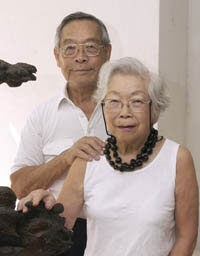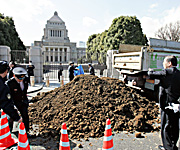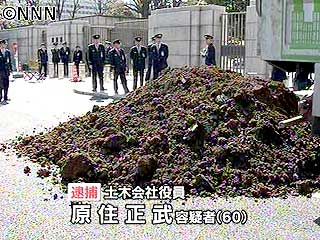Practicing law as a foreigner in Japan is riddled with regulatory issues. Technically, you’re not supposed to handle legal cases unless you’re admitted to the Japanese bar. And while you can be admitted to the Japanese bar by virtue of being a lawyer in a foreign state, you become a gaikokuho jimu bengoshi or “foreign law attorney,” and you’re only technically allowed to advise on your home state’s law.
This wasn’t always the case. Until the late 1950s, a foreigner could be admitted to practice law in Japan by becoming a junkaiin or “quasi-member” of the bar association, which required special permission from the Supreme Court, but gave the foreign lawyer all the privileges of a Japanese lawyer. The junkaiin admitted at the time of the system’s abolition were the only foreigners allowed to practice law in Japan until the mid-80s (with the exception of Thomas Blakemore, a nutter who managed to pass the bar exam in Japanese).
There are only four junkaiin still alive today. Last time I checked last year, there were six! So we’re watching an interesting piece of legal history fade away with time. Here are the four who are still around to tell their stories:
JAMES ADACHI
 James Shogo Adachi (photo, right) is a partner in the Tokyo law firm of Adachi, Henderson, Miyatake & Fujita. It looks like a small firm, as it only has four attorneys at present, but it has trained many of the top corporate and commercial lawyers working in Japan today (including the managing partner of the firm where I once worked).
James Shogo Adachi (photo, right) is a partner in the Tokyo law firm of Adachi, Henderson, Miyatake & Fujita. It looks like a small firm, as it only has four attorneys at present, but it has trained many of the top corporate and commercial lawyers working in Japan today (including the managing partner of the firm where I once worked).
Adachi was president of the American Chamber of Commerce in Japan in the early 1970s. Now, he is essentially retired and lives in San Francisco.
His late wife Barbara (who died in 2005) is also an interesting figure. She was born in Harbin before the war, as her father was managing Citibank’s operations there, and she spent most of her youth in prewar Tokyo, leaving for college in the US just in time to miss World War II. She came back in 1946 to work for the occupation government and stayed in Tokyo until her death, becoming prominent in the local foreign women’s community. She was also a bunraku (traditional puppet theater) fan, and donated a massive bunraku library to Columbia University.
FRANCIS SOGI
 Francis Sogi (pictured with his wife Sarah) is a first generation Japanese-American born in Hawaii. He entered the University of Hawaii shortly before World War II broke out: while his ROTC unit was pulled into active service, he was almost deported from Hawaii before he volunteered to stay in the Army. He was in Army Intelligence for the duration of the war, and then completed his business degree at Hawaii and a law degree at Fordham.
Francis Sogi (pictured with his wife Sarah) is a first generation Japanese-American born in Hawaii. He entered the University of Hawaii shortly before World War II broke out: while his ROTC unit was pulled into active service, he was almost deported from Hawaii before he volunteered to stay in the Army. He was in Army Intelligence for the duration of the war, and then completed his business degree at Hawaii and a law degree at Fordham.
Sogi is a “lifetime partner” in the law firm of Kelley Drye & Warren, which seems to practically mean that he retired from the firm on good terms (he’s no longer listed in active practice there). Most of his career was in New York, but he qualified as a junkaiin and still holds that status today. He maintains an office in Kioicho, Tokyo, which has the somewhat awkward name of “Sogi Foreign-Qualified Attorney Law Office” (蘇木外国弁護士資格者法律事務所). He’s a very charitable fellow, a big figure in the Japanese-American community and a major benefactor of the University of Hawaii.
RICHARD RABINOWITZ
 Richard Rabinowitz is currently a part-time advisor to Tozai Sogo Law Offices, a smallish firm in Kioicho that handles international litigation and commercial work.
Richard Rabinowitz is currently a part-time advisor to Tozai Sogo Law Offices, a smallish firm in Kioicho that handles international litigation and commercial work.
He studied Japanese during World War II, went to Yale Law School after the war, was admitted in Japan in 1953 and co-founded the law firm of Anderson, Mori & Rabinowitz. Although Anderson Mori was initially run by Americans (Mori was a Japanese-American), all three name partners left by the end of the decade and the firm was taken over by Japanese lawyers. Following its merger with Tomotsune & Kimura it became Anderson Mori & Tomotsune, and is now one of the largest law firms in Japan, with offices on top of the Izumi Garden Tower in Tokyo. (It’s also known as one of the least hospitable work environments for foreign lawyers in Tokyo: the “NOVA” of law firms, if you will.)
After departing from Anderson Mori, Rabinowitz obtained a Ph.D. from Harvard, in the course of which he wrote the first comprehensive English article on the Japanese bar. He was later admitted to the bar in South Korea (although I have no clue how), and taught for several semesters at Harvard and Yale.
REINHARD EINSEL
 Reinhard Einsel is an intellectual property specialist at Kawamitsu & Einsel, a firm in Okinawa.
Reinhard Einsel is an intellectual property specialist at Kawamitsu & Einsel, a firm in Okinawa.
He was admitted to practice law in Okinawa in 1965, when the islands were still occupied by the US, and was grandfathered in as a Japanese junkaiin when Okinawa was returned to Japan in 1972. (There are only eleven other practicing lawyers who joined the Japanese bar as a result of the Okinawa handover, and all of them are Japanese.) So Einsel has the advantage of being slightly younger than his counterparts on the mainland, and will probably be the last of the junkaiin because of the unique way he came into the system.



 James Shogo Adachi (photo, right) is a partner in the Tokyo law firm of Adachi, Henderson, Miyatake & Fujita. It looks like a small firm, as it only has four attorneys at present, but it has trained many of the top corporate and commercial lawyers working in Japan today (including the managing partner of the firm where I once worked).
James Shogo Adachi (photo, right) is a partner in the Tokyo law firm of Adachi, Henderson, Miyatake & Fujita. It looks like a small firm, as it only has four attorneys at present, but it has trained many of the top corporate and commercial lawyers working in Japan today (including the managing partner of the firm where I once worked). Francis Sogi (pictured with his wife Sarah) is a first generation Japanese-American born in Hawaii. He entered the University of Hawaii shortly before World War II broke out: while his ROTC unit was pulled into active service, he was almost deported from Hawaii before he volunteered to stay in the Army. He was in Army Intelligence for the duration of the war, and then completed his business degree at Hawaii and a law degree at Fordham.
Francis Sogi (pictured with his wife Sarah) is a first generation Japanese-American born in Hawaii. He entered the University of Hawaii shortly before World War II broke out: while his ROTC unit was pulled into active service, he was almost deported from Hawaii before he volunteered to stay in the Army. He was in Army Intelligence for the duration of the war, and then completed his business degree at Hawaii and a law degree at Fordham. Richard Rabinowitz is currently a part-time advisor to
Richard Rabinowitz is currently a part-time advisor to  Reinhard Einsel is an intellectual property specialist at
Reinhard Einsel is an intellectual property specialist at